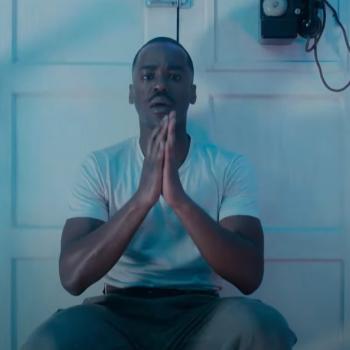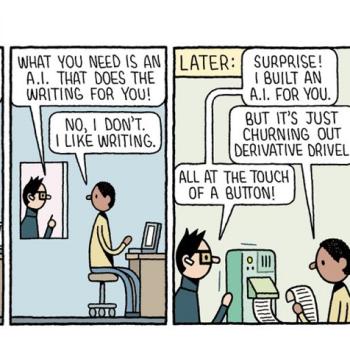We can certainly use the story to ask difficult questions about how we personify and anthropomorphize God, but in doing so we will have to read against the grain of the story. We will need to ask whether God is to be thought of as a celestial Andrea Yates, who even though she knows every hair on each of her children’s heads, nonetheless submerges each one in the water until they are drowned, because she knows she cannot protect them from turning away from her and living evil lives in the future. But in so doing, most would say that she herself has crossed the border into evil and/or insanity. The flood story can make us ask: do we depict God as evil or insane? But the story still sits uncomfortably in our tradition even if we try to answer “no”, and all the pairs of cute furry animals in the world will not make the story one that is appropriate for children.
The best way to make sense of the story is to show how it, like all the Biblical literature, reflects the development of human thinking about God that has led us to where we are today, rather than as static proclamations of things one ought to believe about God. The story of Noah and the flood makes the most sense (even if it remains problematic) when contextualized in this way. The author of the story in the Bible (who seems to have drawn on two earlier Israelite accounts) ultimately derives the story from his broad Mesopotamian heritage. The Israelite authors were trying to make sense of a story they could not simply discard, in the context of their monotheistic worldview. In the earlier story found in the Gilgamesh epic, the polytheistic context allows one to make sense of the story – some gods want to wipe out the noisy humans, but one that does not saves Utnapishtim. There is no need, in that context, to have a deity who at once is interested in saving human life and destroying it. In the context of ancient Israel’s ethical monotheism, the author of the Noah story does the best he can with what he had inherited, and attributes the flood to the one God (what else could he do?) and explains the action as judgment on human sinfulness (how else could he make sense of it?).
In our various canons of Scripture, we have not only the story of Noah, but that of Job, which shows (as do other stories) that one cannot simply do what the author of Genesis did, and Job’s friends did: i.e. blame disasters on humans having done things wrong and thus having deserved to have bad things happen to them. In light of what we know from geology, which the author of Genesis did not, namely that such a worldwide flood never happened, we have other options available. In light of the book of Job, and our scientific understanding of floods and tsunamis, we not only have the option of exploring other approaches, it is absolutely imperative that we do so.
In the end, the story of Noah reminds us that we think about theology in historical contexts, with limited human reason, in partial and piecemeal ways. Its challenge to us is that any language that we today use about God will look as inadequate and perhaps even as horrific to future generations of humans, as that in the Noah story does to us.













